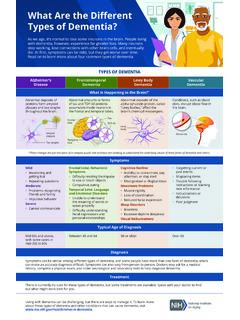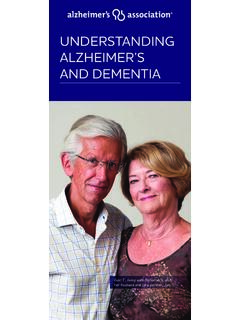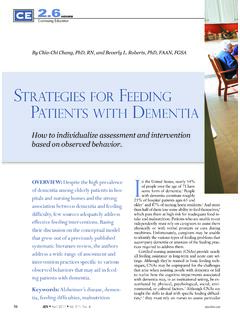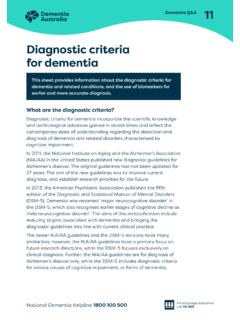Transcription of Making a Difference in Dementia - GOV.UK
1 Making a Difference in Dementia Nursing Vision and Strategy Refreshed editionTitle: Making a Difference in Dementia : Nursing vision and strategy refreshed editionAuthor: Nursing, Midwifery & Allied Health Professions Policy Unit, Quality Division, Strategy and External Relations Directorate 32400 Document Purpose: PolicyPublication date: September 2016 To be reviewed in 2 yearsTarget audience: Registered nurses; Directors of Nursing; Staff working in health and social care services; Chairs and members of local safeguarding adult boards; Lecturers and those who deliver professional training. Contact details: Dr Ben Thomas Mental Health, Learning Disability and Dementia Care Professional Officer Nursing, Midwifery & Allied Health Professions Policy Unit Strategy and External Relations Directorate Department of Health, 79 Whitehall, London, SW1A 2NS Email: may re-use the text of this document (not including logos) free of charge in any format or medium, under the terms of the Open Government Licence.
2 To view this licence, visit Crown copyright Published to , in PDF format only. 3 ContentsIntroduction 5 Part one: Refreshing our vision 6 Dementia facts 6 The 2010 Dementia Challenge 6 Compassionate practice 7 Part two: The role of the nurse in Dementia 9 The nurse s role 9A new vision for the nurse s role in Dementia 10 Dementia Core Skills Education and Training Framework 11 Research 12 Nurse s role within all phases of Dementia 12 Part three: Guidance and resources 16 Guidance documents 16 Resources 184 Making a Difference in Dementia : Nursing Vision and Strategy RefreshedIntroduction 5 IntroductionThe Making a Difference in Dementia .
3 Nursing Vision and Strategy, published in March 2013, set out our vision of how nurses could maximise their unique contribution to high-quality, compassionate care and support for people with Dementia and their carers/families. In the past three years a great deal has been achieved, including the following: There has been a continued increase in Dementia awareness, with more than 515,967 NHS staff at the end of March 2015 completing Tier 1 training to better support people with Dementia . Tier 1 training continues to be rolled out, with a view to reaching all NHS staff by the end of 2018. The publication of the Dementia Core Skills Education and Training Framework in October 2015 will help us to achieve this goal, by assuring the quality and consistency of Dementia training for all health and care staff. More than one million people have become Dementia Friends across England. The Alzheimer s Society s Dementia Friends programme is the biggest ever initiative aimed at changing people s perceptions of Dementia , transforming the way we all think, act and talk about Dementia , to help improve awareness and understanding.
4 Dementia Friends are helping to create communities in which people living with Dementia feel more understood and included. The 2020 Dementia Challenge, published in February 2015, builds on the achievements of the previous 2012 15 Challenge. It identifies what needs to be done by the NHS, social care, voluntary, community sectors and society at large, to make sure that Dementia care, support, awareness and research are transformed by 2020. The 2020 challenge focuses on risk reduction, health and care, continuing investment in research and expansion of Dementia -friendly communities. The Implementation Plan published in March 2016, sets out priority actions to ensure that the commitments set out in the 2020 Dementia Challenge are spirit and values set out in Making a Difference in Dementia : Nursing Vision and Strategy remain as relevant today as three years ago. We want to build on these, while appreciating that emerging challenges require a fresh approach. This refreshed edition of Making a Difference in Dementia : Nursing Vision and Strategy reinforces the fundamental role nurses play in providing health promotion, care and support to people so they can live well with Dementia .
5 It aims to support all nurses, irrelevant of registration or specialty, to be responsive to the needs of people with Dementia , continue to develop their skills and expertise, and improve the contribution they make in achieving best outcomes for people with Dementia , their carers and families, and Making a Difference in Dementia : Nursing Vision and Strategy RefreshedPart one: Refreshing our visionDementia facts Dementia is not an inevitable part of ageing. However, as our population ages, the number of people living with Dementia is set to increase. There are around 676,000 people with Dementia in England, and this number is expected to double in the next 30 years. Dementia mainly affects older people, though it can start before the age of with a learning disability are at a much higher risk than the general population. For example, people with Down s syndrome aged 50-59 have a one in three chance of having is progressive. Initial symptoms include memory loss and difficulties with thinking, problem-solving or language.
6 The most common types are Alzheimer s disease, vascular Dementia , frontotemporal Dementia and Dementia with Lewy bodies. Timely diagnosis along with support and treatment are helping more people with Dementia stay active and independent; and younger people to stay in work for affects people differently and the level of support required will vary. It is important to recognise that no two people with Dementia or their carers are the same, and individuals will have unique and differing are around 540,000 carers of people with Dementia in England. Half of them are employed and it is estimated that 66,000 people have already cut their working hours to make time for caring, while 50,000 people have left work all 2020 Dementia ChallengeThe 2020 Dementia Challenge aims to transform Dementia care, support and research. By 2020 England should be: the best country in the world for Dementia care and support and for people with Dementia , their carers and families to live; and the best place in the world to undertake research into Dementia and other neurodegenerative diseases.
7 The Government s key aspirations include: improved public awareness and understanding of the factors which increase the risk of developing Dementia and how people can reduce their risk by living more healthily in every part of the country, people with Dementia having equal access to diagnosis as for other conditions every person diagnosed with Dementia having meaningful care following their diagnosis, which supports them and those around them, with meaningful care being in accordance with published National Part one: Refreshing our vision 7an older person who is considered incapable of Making decisions and going outa person living well with Dementia with a life story, family, community and social network, who will need help and changing levels of support as the condition ebbs, flows and progressestraditional view prevalent view Person with dementiaInstitute for Health and Care Excellence (NICE) quality standards. This care may include, for example: receiving information on what post-diagnosis services are available locally and how these can be accessed access to relevant advice and support to help and advise on what happens after a diagnosis and the support available through the journey carers of people with Dementia being made aware of and offered the opportunity for respite, education, training, emotional and psychological support so that they feel able to cope with their caring responsibilities and to have a life alongside caring all NHS staff having received training on Dementia appropriate to their role all hospitals and care homes meeting agreed criteria to become a Dementia -friendly health and care setting an increase in the numbers of people of Black, Asian and Minority Ethnic origin and other seldom heard groups who receive a diagnosis of Dementia .
8 Enabled through greater use by health professionals of diagnostic tools that are linguistically or culturally appropriate Dementia research as a career opportunity of choice, with the UK being the best place for Dementia research through a partnership between patients, researchers, funders and society. The contribution of all registered nurses to achieving this vision is crucial given that they have regular contact with patients. Nurses are in a unique position to provide every person with Dementia and their carers and families with high-quality, compassionate care from diagnosis through to end-of-life practice Looking at the person with Dementia , and Dementia itself, with a fresh vision shapes the nurse s role and characterises it as person-centred, compassionate and Dementia is seen as a long-term condition, it can be divided into phases, which helps articulate where the person might be in the process and how nurses can provide excellent nursing care and support. These phases overlap and are not necessarily distinct or always sequential, but they provide a framework for understanding and timely Making a Difference in Dementia : Nursing Vision and Strategy RefreshedPhases of Dementia .
9 A frameworkPhase 1 When memory or other problems prompt the person or carer/family to voice concerns Phase 2 Learning that the condition is dementiaPhase 3 Learning more about Dementia , self-management, options for treatment, care and supportPhase 4 Getting the right help at the right time to live well with Dementia , prevent crises, and manage togetherPhase 5 Getting help to stay at home or if needed move to alternative care accommodationPhase 6 Receiving care, compassion and support at the end of lifeThe phases reflect the experiences of people living with Dementia , from recognising that there might be memory problems through to learning about how best to live well with the condition, preventing and managing crises, and reaching the end of life with dignity and compassion. The phases are also relevant to partners, carers and families. Dementiaa debilitating conditiona long-term condition affecting memory, cognitions, health and behaviour experienced by the person and their family/carersthat can benefit from proactive planning, timely treatment, support and compassionate caretraditional view prevalent view Part two: The role of the nurse in Dementia 9 Part two: The role of the nurse in dementiaThe nurse s roleOur refreshed vision defines the nurse s role as: interpersonal varied in action and intensity taking place in a variety of settings welcoming individuals, family, significant others and carers and respecting their diversity and cultureto ensure that all registered nurses are able to deliver safe, high-quality, compassionate care within all care settings, including a person s own vision for the nurse s role in Dementia is primarily an interpersonal and social model of care.
10 This is not new, but applying it in practice along with the medical aspects of care requires a person-centred approach and commitment. Regardless of the setting or the nurse s registration or speciality, the interpersonal and psycho-social model of care in Dementia includes: understanding the unique experiences of a person living with Dementia building and maintaining a relationship with the person and their family respecting the person and their family and treating them with dignity and compassion, taking account of their culture this is especially important when supporting people from ethnic minority communties recognising the person for who they are and taking the time to understand their life story, interests, preferences, wishes, social networks, and strengths and abilities developing person-centred outcomes with the person and their family that recognise and anticipate the phases of the condition promoting and providing a Dementia -friendly environment seeking alternative sources of support, including signposting to non-medical services, if unable to provide direct assistance identifying and reporting any potential form of abuse that the person with Dementia may be going Making a Difference in Dementia .
















